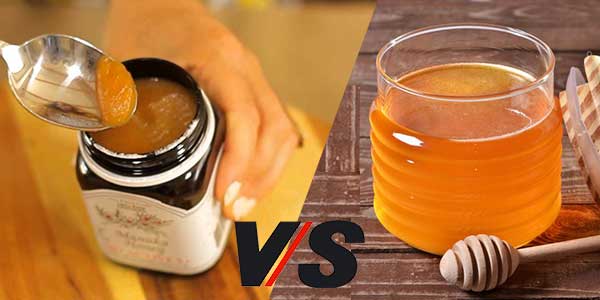Is Manuka honey better than normal Honey and is it worth the high price tag?
This is a question we get asked a lot, so we’ve spent some time investigating the answer.
What is Manuka honey?
Manuka honey only comes from New Zealand. It is a honey produced by bees who pollinate the flower Leptospermum scoparium, more commonly known as the Manuka or Tea Tree plant. Although Tea Tree plants grow in other places around the world, ‘Manuka’ is a Māori word trademarked to New Zealand…. and this is where the subject gets interesting! Research by the main honey producers’ organisation in New Zealand has revealed that only 1,700 tonnes of Manuka honey are produced there each year. So how is it possible that every time we walk into a UK shop such as Tesco, Sainsburys, Waitrose or Holland and Barrett, we find that jars of Manuka honey are always on the shelves? The answer? It would appear that a large proportion of these jars of ‘Manuka’ honey only contain a trace amount, if any Manuka honey at all! Although only 1,700 tonnes of New Zealand Manuka honey are produced annually, it’s estimated that as much as 10,000 tonnes of honey labelled as ‘Manuka’ are sold every year around the world and 1800 tons of that is in the UK. In fact, the Food Standard Agency’s National Food Crime Unit found that a third of test samples labelled as ‘Manuka honey’ in the UK were ‘non compliant’. The mis-selling of ‘Manuka’ honey is clearly a big issue, and Oxford-based Rowse Honey – one of the UK’s biggest honey companies – says the current Manuka honey labelling guidelines are ‘flawed’.
Is Manuka honey better for you than regular / raw British honey?
Manuka honey is sometimes referred to as medicinal honey because it has a high antibacterial activity and has been shown to be good for wound healing and can help to relieve sore throats, mouth ulcers and sore gums.
However, Anna Parker, accredited practising dietitian of The Biting Truth, is not convinced that Manuka honey is more superior than other honeys and has made the following statement.
“It is the antibacterial component of Manuka honey that is thought to set it apart from regular honey. However, there is limited evidence to suggest it is a much superior product. Also, it is important to note that not all Manuka honeys are equal and it can be difficult to know what you’re getting.”
Our Conclusion
We don’t doubt that Manuka honey has some unique qualities and it may be beneficial for your heath if you can guarantee that you are getting a jar of pure Manuka honey. There has been a lot of research on Manuka, which looks promising, however at this point we can’t find any hard evidence to suggest that it is any better for your health than good old ‘normal’ UK honey. The suggestion – from lots of different sources – is that there is a massively larger quantity of Manuka honey being sold around the world than is being produced. So, how much of the honey in your jar of Manuka is actually from a Manuka plant – if any?!
Before you opt for a jar of supermarket-bought ‘Manuka honey’, remember that any pure unadulterated quality unpasteurised raw honey, such as Stone’s Honey, has many proven health benefits. ALL pure honeys have natural antibacterial properties and the effects of honey on wound healing have been well researched. Honey is a rich source of chemical compounds such as flavonoids which have been reported to have antibacterial, anti-viral, anti-inflammatory and anti-allergenic properties. Both laboratory studies and clinical trials have shown that honey is an effective broad-spectrum antibacterial agent. All pure unpasteurised honey, including Manuka honey, will contain prebiotics which help to feed the good bacteria in your gut, so in this respect honey may help support a healthy digestive system.
Finally – if you want to be sure that your honey is pure and unadulterated, but with all of the health benefits still available to you, make sure that you invest in a jar of raw, unpasteurised British honey.
